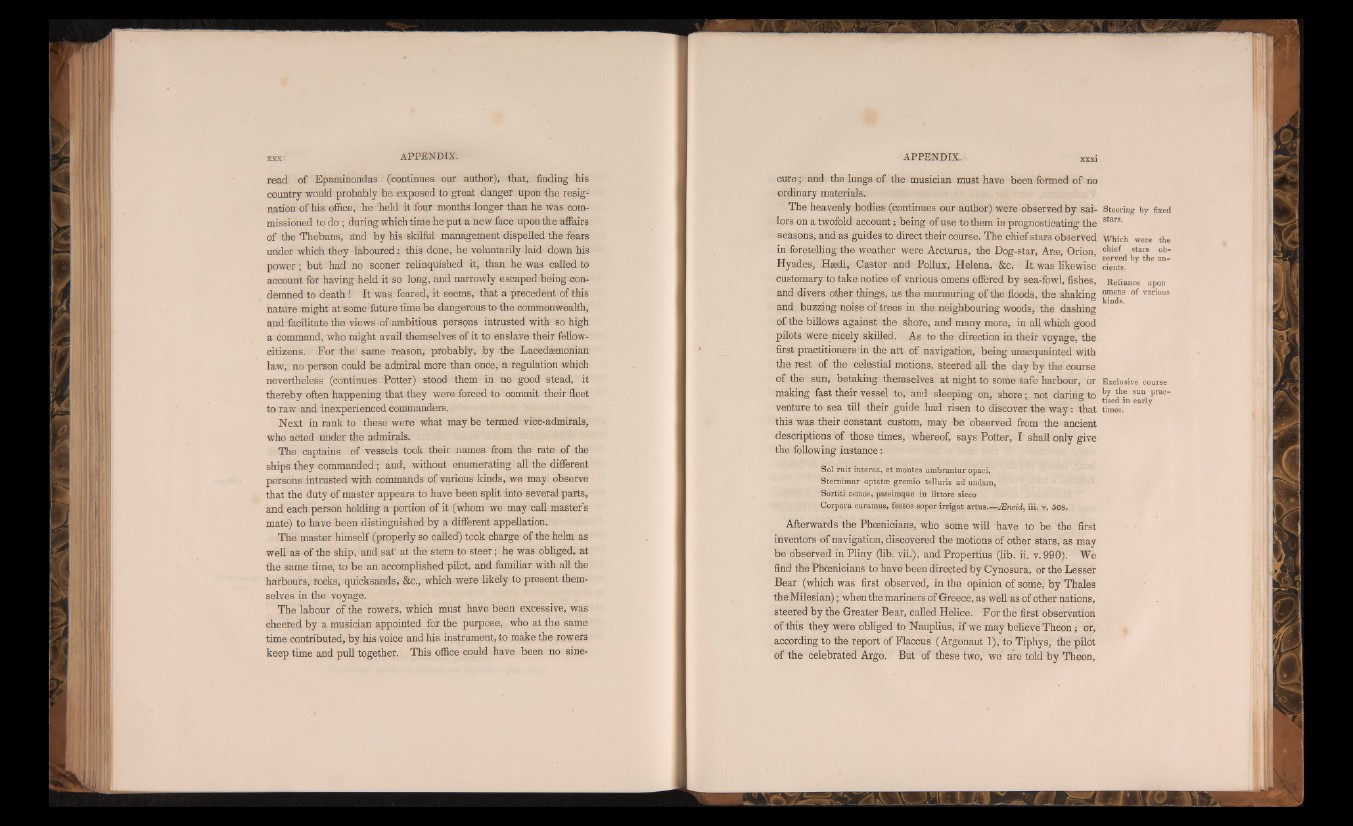
re ad of Epaminondas <*ontinues our author), that, finding his
country would probably be exposed to great danger upon the resignation
of his office, he held it four months longer than he was commissioned
to do ; during which time he put a new face upon the affairs
of the Thebans, and b y his skilful management dispelled the fears
under which they laboured: this done, he voluntarily laid down his
p ow e r; b u t had no sooner relinquished it, than h e was called to
account for having held it so long, and narrowly escaped being condemned
to death ! I t was feared, it seems, that a precedent of this
nature might at some future time be dangerous to the commonwealth,
and facilitate the views of ambitious persons intrusted with so high
a command, who might avail themselves of it to enslave their fellow-
citizens. For the same reason, probably, by the Lacedemonian
law, no person could b e admiral more than once, a regulation which
nevertheless (continues Potter) stood them in no good stead, it
thereby often happening th a t they were forced to commit their fleet
to raw and inexperienced commanders.
N ex t in rank to these were what may be termed vice-admirals,
who acted under the admirals.
The captains of vessels took their names from the rate of the
ships they commanded; and, without enumerating all the different
persons intrusted with commands of various kinds, we may observe
th a t the duty of master appears to have been split into several parts,
and each person holding a portion of it (whom we may call master’s
mate) to have be en distinguished by a different appellation.
The master himself (properly so called) took charge of the helm as
well as of the ship, and sat' at the stern to ste e r; he was obliged, a t
the same time, to b e an accomplished pilot, and familiar with all the
harbours, rocks, quicksands, &e., which were likely to present themselves
in the voyage.
T he labour of the rowers, which must have been excessive, was
cheered by a musician appointed for the purpose, who at th e same
time contributed, by his voice and his instrument, to make the rowers
keep time and pull together. This office could have been no sinecure
; and the lungs of the musician must have been formed of no
ordinary materials.
The heavenly bodies (continues our author) were observed by sailors
on a twofold account; being of use to them in prognosticatirig the
seasons, and as guides to direct their course. The chief stars observed
in foretelling the weather were Arcturus, the Dog-star, Arae, Orion,
Hyades, Haedi, Castor and Pollux, Helena, &c. I t was likewise
customary to take notice of various omens offered b y sea-fowl, fishes,
and divers other things, as the murmuring of the floods, the shaking
and buzzing noise of trees in the neighbouring woods, the dashing
of the billows against the shore, and many more, in all which good
pilots were nicely skilled. As to the direction in th e ir voyage, the
first practitioners in the art of navigation, being unacquainted with
the rest of the celestial motions, steered all the day b y the course
of the sun, betaking themselves at night to some safe harbour, or
making fast their vessel to, and sleeping on, sh o re ; not daring to
venture to se a till their guide had risen to discover the w a y : that
this was their constant custom, may be observed from the ancient
descriptions of those times, whereof, says Potter, I shall only give
the following instanc e:
Sol ru.it interea, et monies umbrantur opaci,
Stemimur optatse gremio telluris ad undam,
Sortiti remos, passimque in littore sicco
Corpora curamus, fessos sopor irrigat artus.—Mneid, iii. y. 508.
Afterwards the Phoenicians, who some will have to be the first
inventors of navigation, discovered the motions of other stars, as may
be observed in Pliny (lib. vii.), and Propertius (lib. ii. v. 990). We
find the Phoenicians to have been directed by Cynosura, or the L esser
Bear (which was first observed, in the opinion of some, b y Thales
the Milesian); when the mariners o f Greece, as well as of other nations,
steered by the Greater Bear, called Helice. Fo r the first observation
of this they were obliged to Nauplius, if we may believe T h e o n ; or,
according to the report of Flaccus (Argonaut 1), to Tiphys, the pilot
of the celebrated Argo. But of these two, we are told b y Theon,
Steering by fixed
stars.
Which were the
chief stars observed
by the ancients.
Reliance upon
omens of various
kinds.
Exclusive course
by the sun practised
in early
times.